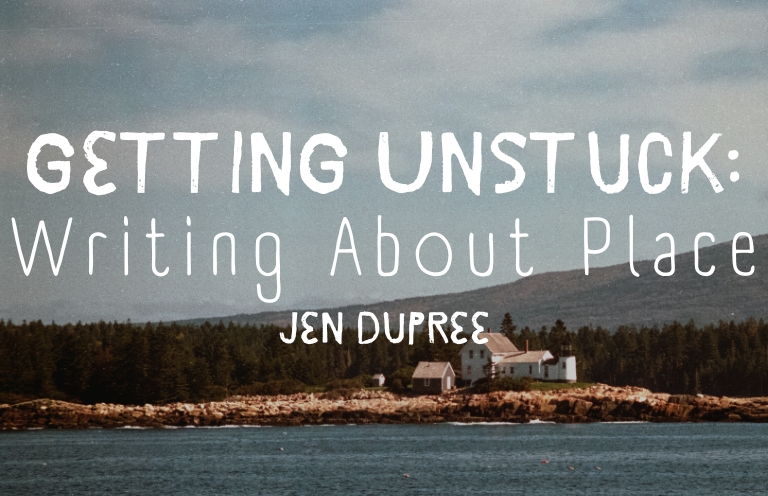Our last Getting Unstuck of the year is focused on place. Jen Dupree has rounded up more resources for you on how to write what you know best, or what you may not know as well as you think. Let’s get unstuck one last time this year!

I live in Maine, where there was recently a mass shooting in a town I know well. Because we—especially those of us who live here—think of Maine as bucolic, the violence of the shootings felt like a violation of our sanctity. We’re also pretty resilient here in Maine—something about the cold and isolation makes us so—and we’re pretty action-oriented. Already, a friend of mine is working on putting together an anthology of Maine stories, the proceeds of which will go to charity. While some of my writing is based on small towns in Maine, I feel like for the story I might write for this anthology, Maine has to be elevated to more than backdrop. Place, in this case, needs to function on the level of character—that is, the story wouldn’t be the same if it were set anywhere else. How, though, do we create a sense of place in our stories?
The first step is to notice the place. Not just what the landscape or architecture looks like—although that’s a decent place to start—but, all the sensory details. In this episode of Write-minded, Brooke Warner says “that’s going to include smells and textures and the quality of the light…how the people interact with one another.” Her co-host, Grant Faulkner, adds you want to think about “how you see a place, how it smells, how it might taste.”
Noticing sounds simple, but it’s kind of hard. It’s easy to stop paying attention when you aren’t afraid of getting lost or you’re charmed by the smell of roasted peanuts on the street. Warner and Faulker suggest it’s more difficult to write about a place you know well as opposed to somewhere new and unfamiliar. Warner says, “an outsider looking in can bring a really meaningful perspective” because “if you’re writing a place you know… [you might] take for granted what you know.” It’s true that it’s easy to overlook the familiar, and it’s true that when you’re in an unfamiliar place, your senses are often turned way up. Noticing the familiar is a skill you can cultivate, though, by slowing down, by pausing to note the details, by, in a sense, acting like a tourist in your own neighborhood.
The next part of writing about place is deciding which details to include. In addition to the sensory details noted above, there are details like how people dress, what kinds of food people eat, the work people do, noises, weather, distance between the houses, condition of the roads—I could go on and on. You can’t include every detail of a place without smothering your story. You have to choose the details that help create the place that feed the story you’re telling. In this episode of The Creative Penn, Joanna Penn speaks with Linda Lappin, author of The Soul of Place: A Creative Writing Workbook: Ideas and Exercises for Conjuring the Genius Loci. Lappin says, ”Place is another way of expressing character.” Just like the characters we create, the place should be rendered with only the most important, story-relevant details. All details need to add weight and texture to a story. They can create suspense or a sense of comfort. If I were to write about hiking up a mountain, for example, I could write about the occasional chipmunk my dog chases, the softness of the small waterfalls, and the sweeping views of nearby mountain ranges I see as I munch my apple at the top. Or, I could write about the relentless black flies that seem undeterred by any amount or kind of bug spray, the poorly marked trail that took us a panicky hour off-route, or the time it was a full thirty degrees colder at the top of the mountain than when we started. All of those things are true, but the particular details will drastically change the feel of a story. A first-date hike in the first scenario sounds lovely; the second, not so much (I think it would be more fun to write the second scenario). Penn says, “We don’t need every single thing about the place…we need the things that bring our story to life.”
And then, finally, think about how you (or your characters) feel about the place. Do you fit in or do you feel like an outsider? Did you feel like you had enough (food, money, resources)? Too much? Did you love the heat or hate the cold? Were you always getting flat tires on poorly maintained roads? Here, the Writers Guild Foundation presents a panel discussion “Location as Character: The Craft of Writing Place.” The panel, moderated by Dr. Rosanne Welch, features TV writers Ayanna Floyd Davis (The Chi), Connor Kilpatrick (Young Sheldon), Matt Lutsky (On Becoming a God in Central Florida), and Anthony Sparks (Queen Sugar). Davis makes the point that the writing about a place needs to be factual to a point, but the real craft of writing is rendering a location emotionally true. That means you don’t necessarily need to get hung up on the exact temperature on the day of that freak hail storm, but the reader would want to know what hail sounded like on your roof (or tent, or car, or outhouse).
I’m still not entirely what I want to say about Maine, but I’m spending the next few weeks taking notes about what I notice. Today, we were on our thirtieth bag of leaves, trying not to slip on about a million acorns, when a man and woman walking by stopped to introduce themselves. They’re new to the area and wanted to say hello. That’s one way I think of this place.
by Jen Dupree
